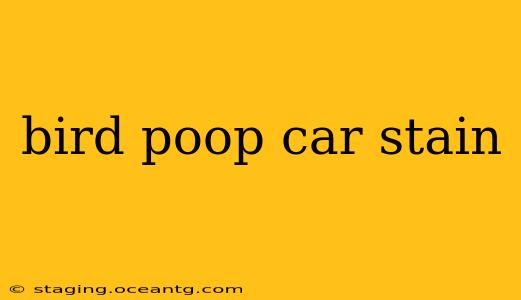Bird droppings, while a natural occurrence, can leave unsightly and potentially damaging stains on your car's paint. The uric acid in bird droppings is corrosive and can etch the clear coat if left untreated. This guide provides comprehensive steps to effectively remove bird poop stains and protect your car's finish.
What Happens When Bird Poop Sits on Your Car?
Bird droppings contain uric acid, which is highly acidic and can quickly damage your car's paint. The longer it sits, the more likely it is to etch the clear coat, leading to permanent damage. Sun exposure exacerbates this effect, accelerating the etching process. Therefore, prompt removal is crucial.
How to Remove Bird Poop Stains from Your Car: A Step-by-Step Guide
The key to effective bird poop removal is speed and the right technique. Avoid harsh scrubbing, which can scratch the paint. Here's a recommended approach:
-
Act Fast: The sooner you clean up the bird droppings, the better. Ideally, remove them as soon as you notice them.
-
Rinse with Water: Gently rinse the affected area with cool water. This helps to loosen the droppings and minimize the acidic contact time with the paint. Avoid using hot water, as it can cause the droppings to bake onto the paint.
-
Wash with Car Wash Soap: Use a quality car wash soap designed for delicate paint surfaces. Apply the soap with a soft wash mitt or sponge, gently working it over the stain in a circular motion. Rinse thoroughly with water.
-
Inspect for Remaining Stains: Once rinsed, carefully inspect the area. If the stain persists, you might need a more thorough cleaning.
-
Use a Detailing Clay Bar (Optional): For stubborn stains that remain after washing, a detailing clay bar can help remove embedded particles and residue. Follow the instructions on the clay bar package carefully. This step is especially beneficial for removing ingrained dirt that contributes to the stain.
-
Apply a Protective Wax or Sealant (Optional): After cleaning, apply a high-quality car wax or sealant to protect the paint and restore its shine. This helps prevent future damage and maintains the integrity of the clear coat.
What Cleaning Products Should I Avoid?
Avoid using abrasive cleaners, harsh chemicals, or anything that could scratch the paint. These can cause more damage than the bird droppings themselves. Specifically avoid:
- Bleach: Can damage the paint's finish and even the underlying metal.
- Acetone: Highly aggressive and unsuitable for automotive paint.
- Abrasive scrub brushes: Can scratch your car's clear coat.
What if the Bird Poop Etched My Car's Paint?
If the bird poop has already etched your car's paint, removing the stain completely might be impossible. In such cases, you might consider professional detailing or paint correction services. These professionals have specialized tools and techniques to minimize the appearance of the etching.
How Can I Prevent Bird Droppings on My Car?
While you can't entirely prevent birds from landing on your car, you can take steps to minimize the risk:
- Park in a Garage: The most effective way to prevent bird droppings is to park your car in a garage.
- Use a Car Cover: A car cover can help protect your vehicle from bird droppings and other environmental contaminants.
- Regular Washing: Frequent washing can help remove droppings before they cause significant damage.
How often should I wash my car to prevent bird poop damage?
Regular washing, ideally once a week or more frequently depending on your location and parking situation, is recommended to prevent bird poop from etching the paint. More frequent washing minimizes the time bird droppings are in contact with the paint, significantly reducing the risk of damage.
This guide provides a comprehensive understanding of bird poop car stains, their removal, and prevention. Remember, prompt action and gentle cleaning techniques are key to maintaining your car's paintwork. If you are uncertain about any step, consulting a professional detailer is always recommended.
